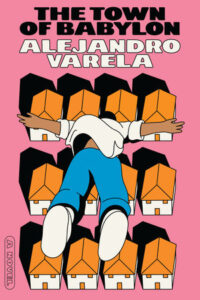When People Assume Your Fiction is About Your Life
Alejandro Varela on the Everlasting Struggle of Writers to Explain Otherwise
I’ve been asked many times over the years if I’m writing about myself. I’ve also been asked to confirm and to give more detail to the events within my work that the reader believes to be true. My story in Harper’s prompted many people to inquire about my time at the UN—no, never have I worked there. After my work appeared in the Boston Review, a colleague offered to put me in touch with an oncologist in their family because of the protagonist’s cancer. A story in the Rumpus precipitated a call from my mother to ask if everything was okay between my partner and me.
I guess I’ve invited these inquiries by borrowing from my life. But surely every writer of fiction does this. Sometimes we borrow the plot but obfuscate the protagonist. Sometimes we use the details of our lives but nothing else. Sometimes we are ourselves but in a world of our own making. Sometimes it quacks and walks like a duck but is not, in fact, a duck.
Andrés, the protagonist of my novel The Town of Babylon, is a professor of public health. I was briefly an adjunct. Andrés grew up in the suburbs and lives in the city. Me too. Andrés’ parents are immigrants. So are mine. He went to Catholic school. Ditto. Andrés is gay, Latinx, and has strong opinions about pop music. Check, check, check. He scored perfectly on his SATs—well, that’s none of your business.
These nodes of contact might be sufficient for a reader to presume that my novel is a collection of linked diary entries. Or maybe I just made my own bed by divulging these things.
More than that, though, I believe that the risk of conflating my life with that of my protagonist has something to do with my identities. Because I am as marginalized in the publishing industry as I am in society writ large, the reader has no touchstones. I’m obliged to say that the industry is changing and books are more representative of society than they have been at any point in history, but invariably someone tweets a bar graph of the industry’s racial makeup, and I’m reminded that progress is relative. Centuries of stories told by and about white, straight, and cis people means that we don’t have to spend time parsing whiteness or heterosexuality or the poles of the gender spectrum.
Freeing the reader from that level of engagement allows them instead to focus on the plot, the subplots, the subliminal messages, the adjectives, the adverbs. But to be class-jumping, as well as queer and Latinx, isn’t yet a well-trod landscape in literature. And so the focus shifts to those identities. They have to be announced and clarified and detailed. Until suddenly, I’ve gone from novelist to ethnographer. From real person to character. And back again.
What rubs me the wrong way isn’t the assumption that I am my own protagonist, but instead its implication of artistic laziness.This transmutation is further compounded by the realism of my fiction. The reader will certainly recognize the world—the American suburb, the 1990s, Trump’s America—even if the perspective is unfamiliar. Under these circumstances, they will default to verisimilitude.
And what if Andrés and I become interchangeable in the eyes of God and critics and my mother? Ultimately, I fear that any interrogation into my life will be backhanded. The assumption itself feels euphemistic, a shorthand sort of criticism: This isn’t bonafide fiction because you’re not capable of creating art that isn’t ripped from the headlines of your life.
Maybe that’s what concerns me: that by conflating me with my protagonists, the critiques will be of me and not of my work.This criticism has some validity to it when I consider the modern classics that have influenced me. Novels like The Bluest Eye, The Dispossessed, and In the Time of Butterflies, which I read while I was writing my own. In these books, Morrison, Le Guin, and Alvarez, respectively, mine the human experience and imagination with the fierceness and empathy of poet warriors, all the while reflecting back to the reader our collective realities—past and future. In their company, I am effectively a memoirist.
Maybe, then, what rubs me the wrong way isn’t the assumption that I am my own protagonist, but instead its implication of artistic laziness.
The experience of living with marginalized identities has left me in a perpetual state of hypervigilance and with a not insignificant case of imposter syndrome. The very suggestion that my work lacks rigor or originality picks at those scabs. No, no, please don’t tell the guy who is, at any given moment, bearing three or four psychological crosses that he’s not trying hard enough. Or that his fiction reads like an autobiography and an unoriginal one to boot.
Maybe that’s what concerns me: that by conflating me with my protagonists, the critiques will be of me and not of my work. By assuming this is a veiled memoir, the reader—or maybe it’s the reviewer and the industry—will miss how much of my writing is veiled propaganda. They’ll ignore how I’ve been trying for years to synthesize public health research into plot lines and dialog. They’ll sidestep the argument that I’ve been trying to make all along, namely that collective liberation is the way forward. If no one walked away from my work with a better understanding of how important community is in protecting and improving health, that would be much worse than being accused of writing a veiled memoir, of overusing backstory, of glorifying trauma, of not being believable or creative. It would be worse even than being mistaken with my protagonists.
__________________________________

The Town of Babylon: A Novel by Alejandro Varela is available via Astra House.




















